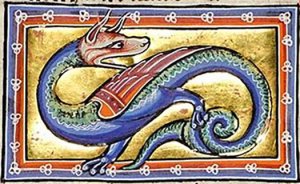Presented By: Medieval and Early Modern Studies (MEMS)
MEMS Graduate Student Showcase 2
Katherine Tapia, Comparative Literature

Humans and Monsters in Early Medieval Literature
Monsters function as social markers of the feasible and plausible. In dissonance to mainstream social constructs, they make people uncomfortable and help them project their fears and anxieties. My work seeks to understand the permanence and fluidity of monstrosity in its physical and psychological perceptions and representations in early medieval literature, taking as samples Beowulf, the Wonders of the East, and the Aberdeen Bestiary.
I argue that while monstrosity is inherent to the monstrous individual, it might have been perceived as permanent but also as changing. For instance, dragons, whose monstrosity is embedded in their physicality and inextricable from it, bear their monstrosity permanently; however, Beowulf, the hero, bears a fluid monstrosity since he displays chivalrous traits when not in combat while assuming a monstrous nature when acquiring colossal – non-human – strength to overpower Grendel. Through this fluctuation, I try to understand the relationship between humans and monsters, and also the capacity of humans to harbor monstrosity.
Monsters function as social markers of the feasible and plausible. In dissonance to mainstream social constructs, they make people uncomfortable and help them project their fears and anxieties. My work seeks to understand the permanence and fluidity of monstrosity in its physical and psychological perceptions and representations in early medieval literature, taking as samples Beowulf, the Wonders of the East, and the Aberdeen Bestiary.
I argue that while monstrosity is inherent to the monstrous individual, it might have been perceived as permanent but also as changing. For instance, dragons, whose monstrosity is embedded in their physicality and inextricable from it, bear their monstrosity permanently; however, Beowulf, the hero, bears a fluid monstrosity since he displays chivalrous traits when not in combat while assuming a monstrous nature when acquiring colossal – non-human – strength to overpower Grendel. Through this fluctuation, I try to understand the relationship between humans and monsters, and also the capacity of humans to harbor monstrosity.